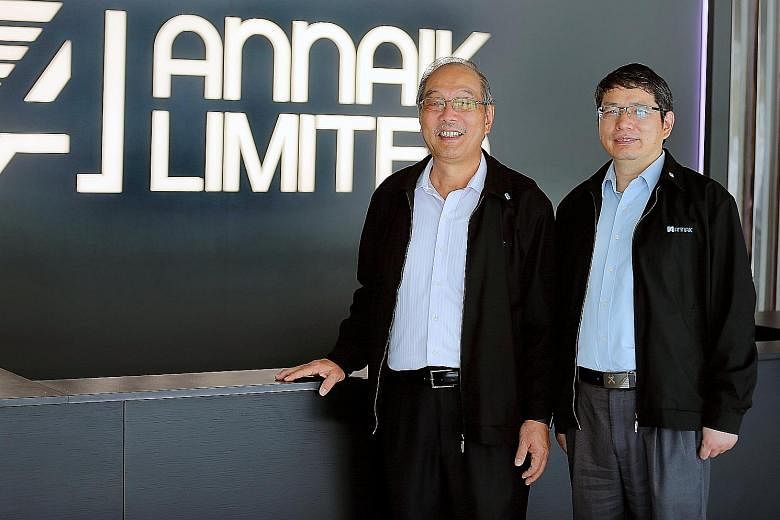Q How did Pioneer's journey begin?
A Pioneer was set up in 2010 by Mr James Ow Chin Seng and Dr Raymond Yang. Our parent company is AnnAik, which specialised in distributing industrial stainless steel products. As members of AnnAik, in 2005, we decided to enter the environmental services market in China and later founded Pioneer in Singapore.
The target is to be the regional leader in providing environmental solutions. We position ourselves as a professional consultancy and service provider that not only supplies products, but also installs and manages full-scale water reclamation projects.
Q What are Pioneer's operations like?
A We focus on waste management and chemical industries, especially in the solid-liquid and liquid-liquid separation fields.
Our main operations are in Singapore and China.
We provide consultancy services in all aspects of water management, filtration, recovery and disposal. Particularly, we provide waste-management consultancy services to factories with older industrial systems, to upgrade their systems and optimise their performances.
In addition, we advise firms on the suitable equipment and chemicals to use for their operations.
We provide turn-key systems for processes like wastewater treatment and wastewater recycling, as well as equipment designed and manufactured by our own engineers and designers.
We embark on Build Operate Transfer (BOT) projects for our clients, starting from feasibility studies, followed by installation and management for water purification, water management and solvent reclamation projects. We will bear the cost of building and setting up the facility, and operate it for a period of time before transferring ownership to our client.
Most of our BOT projects are partnerships with the Chinese government pertaining to wastewater treatment. We typically manage the wastewater-treatment plants for 20 to 30 years, before returning them to the government. During this period, we train their local staff on operating and managing the plant.
In 2015, we had a local project with a private company in Singapore for galvanising waste-acid recovery, which usually requires our operational assistance for about five years. This project was supported by Spring Singapore.
In Singapore, we focus on managing hazardous waste and chemical waste in industries.
Q How is your company performing?
A We have about 10 local employees, including support staff as well as engineers and designers. We have five employees in China.
One challenge we face is the limited application of zero liquid discharge (ZLD) technology in Singapore. ZLD is a chemical engineering process and an advanced wastewater-treatment technology, but it is still relatively new in Singapore. This technology is highly beneficial to the environment as it ensures that no discharge is left over from difficult-to-treat wastewater, by purifying and recycling almost all of the industrial wastewater produced. This means the treated wastewater, which is highly concentrated with salts, will not contaminate any surrounding water bodies.
Our engineers have technological expertise in this aspect, but it is less applicable to Singapore's geographical context. Fewer local companies see the importance of this technology, since Singapore is surrounded by sea, which means the discharge of salts from the treated wastewater has no direct impact on the quality of living here. This in turn results in ZLD-related regulations being less stringent in Singapore.
However, many of the inland Chinese provinces require this technology, or else the salt will be discharged into rivers, affecting the quality of drinking water. With increasing focus and stricter regulations from the Chinese government on environmental protection, this has boosted the number of ZLD projects we have in China. Hence, we have decided to refine this technology in Singapore, and apply it in a bigger market like China.
Our annual operational costs are $500,000 in Singapore and $200,000 in China.
Q Do you feel that there is a healthy trend of firms focusing on providing environmental-related services in Singapore?
A Environmental projects are much related to government regulations and policies. Whether an environmental-related company can sustain its operations in a country depends on the amount of focus its government places on protecting the environment.
In Singapore, the Government places huge emphasis on environmental preservation, especially with regard to water conservancy, such as Newater and desalination plants. However, there are certain areas where Singapore is still lacking. For instance, industries need to catch up on the level of advancement for their wastewater-treatment plants, as many of their wastewater systems lack online monitoring technologies.
Most importantly, Singapore must strike a good balance between meeting its environmental needs and catering to economic demands.
Q What are Pioneer's next steps for growth?
A We plan to place more focus on our presence in China, including more BOT projects. The bulk of our revenue comes from Singapore. We are targeting to yield half of our revenue from Singapore, and the other half from China, within two to three years.
We are studying the needs of other markets in terms of environmental technology and assessing the suitability of our technology for these needs. Should conditions be favourable, we hope to expand in South-east Asian countries like Vietnam, Myanmar, Indonesia and Malaysia.

